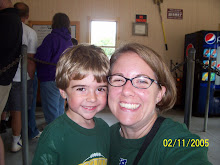Hope...when I didn't have any, my supports carried it for me. Hope is a funny thing, sometimes hard to find - but once it's there, things seem to begin. Hope for me came from peer support. I met some recovery "role models" through NAMI. For the first time, I had positive experiences with individuals with mental illness (vs. the peer support I found in the hospital). I found people who were living recovery - and this gave me tremendous hope. Once the seeds of hope were planted - everything seemed to bloom. I began to look forward to things, began to think differently and had some self-realizations that I could change how I lived with my illness. Today, I hope for many things. I hope to contribute in some way to breaking the stigma that surrounds mental illness - that's why I'm doing the NAMI Walk tomorrow in Appleton, Wisconsin. I hope that one day science will advance in the area of early diagnosis of brain disorders to prevent the often traumatic experience of living with a mental illness. I hope that I can do all those things I've always dreamed of - being the exec director of a nonprofit agency, returning to school, being involved with my son's activities and continuing my road to recovery.
But how do you find hope when you're feeling hopeless? For me, that hope was first carried by my friends. They held onto the "white light" of hope and always encouraged me no matter how dire the circumstances. When you can't find that shred of hope, find someone who can carry it for you. Hope can be found in the smallest things - getting a good night's sleep without a nightmare or anxiety, enjoying an activity that before felt meaningless, finding something new, discovering recovery is possible and seeing a glimpse of a brighter future. Hope for me often looks like a visualization...envisioning what I hope will happen. Whether it's finding a parking spot or attending a college open house to learn about returning to school (and picturing myself there), I find hope perpetuates itself when I overcome the significant (and more insignificant) barriers placed before me.
Right now I'm reading a book my Jerome Groopman called the "Anatomy of Hope." Groopman was an oncologist and treated many who were terminally ill. His book explores how hope plays a role in recovery. He profiles patients who had a great deal of hope to those that had no hope at all. He provides scientific (and anecdotal) evidence on the fact that hope TRULY does make a difference in recovery. I've always believed that hope can aid recovery, but now there is actually scientific evidence that hope changes brain chemistry producing cells that aid in recovery.
Hope is powerful.
So when you can't find hope, find someone to carry it for you until you can pick it back up again. It will be there waiting for you.
Subscribe to:
Post Comments (Atom)


No comments:
Post a Comment